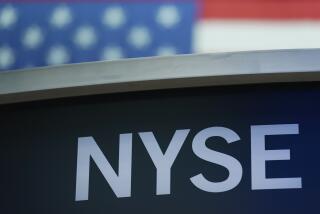Warnings Issued on Dollar’s Slide
- Share via
The European Central Bank and euro zone finance ministers Monday issued their starkest warning to date that they were unhappy with the euro’s surge to record highs against the dollar, and said they were closely monitoring exchange rate swings.
Separately, Japanese Vice Finance Minister Koichi Hosokawa signaled that Japan might intervene in financial markets to slow the yen’s appreciation. Intervention probably would entail selling yen and buying dollars.
The warnings may have helped to spark a modest rally in the greenback, as speculators grew more cautious about further dollar declines. The euro fell to $1.342 in New York from a record high of $1.345 on Friday. The dollar rose to 103.23 yen from 102.09 on Friday.
In an echo of developments that preceded the European Central Bank’s first intervention in the currency markets in 2000, bank President Jean-Claude Trichet joined the chairman of euro zone finance ministers at a news conference in Brussels to reinforce the message of a written statement.
The euro zone nations were trying to lift their currency from record lows in 2000, but four years later they are trying to halt its rocket-like ascent. The strong euro is making the Continent’s exports more expensive abroad.
“We are of the opinion that excessive volatility and disorderly movements in exchange rates are undesirable for economic growth,” the statement said.
Trichet said the statement “clearly says that all major countries and economic areas must play their part more actively in reducing global imbalances” -- a reference to the dollar’s plunge and to the record U.S. trade deficit, among other issues.
Although the statement was a repeat of recent protests against the euro’s rise, language was added to grab the foreign exchange market’s attention.
“We will monitor the situation closely,” it added, using phrasing typically deployed by the Group of 7 industrialized nations.
Currency traders were quick to pick up on the message and the way in which it was delivered.
“I still don’t think the threat of intervention is there yet, but the rhetoric is being stepped up and we have to take this into account,” said Jens Nordvig, a foreign exchange strategist at Goldman Sachs in New York.
Japan’s Hosokawa was more direct in assessing the potential for direct intervention. At a news conference in Tokyo he said “recent yen gains don’t necessarily reflect fundamentals of economies.” Japan, he said, “will act aggressively on [the yen’s] rapid moves in a timely manner.”
More to Read
Inside the business of entertainment
The Wide Shot brings you news, analysis and insights on everything from streaming wars to production — and what it all means for the future.
You may occasionally receive promotional content from the Los Angeles Times.










